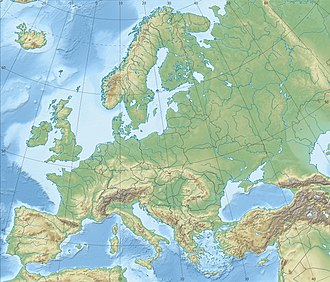
Back معركة بورودينو Arabic معركة بورودينو ARZ Borodino döyüşü Azerbaijani بورودینو دؤیوشو AZB Барадзінская бітва Byelorussian Барадзінская бітва BE-X-OLD Бородинска битка Bulgarian Бородиногой байлдаан BXR Batalla de Borodinó Catalan Bitva u Borodina Czech
| Battle of Borodino | |||||||||
|---|---|---|---|---|---|---|---|---|---|
| Part of the French invasion of Russia | |||||||||
 Battle of Moscow, 7th September 1812 by Louis-François Lejeune, 1822 | |||||||||
| |||||||||
| Belligerents | |||||||||
|
| |||||||||
| Commanders and leaders | |||||||||
|
|
| ||||||||
| Strength | |||||||||
|
103,000–135,000[1] …see § Opposing forces |
125,000–160,000[1] …see § Opposing forces | ||||||||
| Casualties and losses | |||||||||
|
35,000–42,000 killed, wounded or missing[2][3][4][a] 50 generals[b] …see § Casualties |
37,000–53,000 killed, wounded or missing[c][3][2][d][18] 27 generals[e] …see § Casualties | ||||||||
Location within Europe | |||||||||
The Battle of Borodino (Russian: Бopoди́нcкoe cpaже́ниe, romanized: Borodínskoye srazhéniye Russian pronunciation: [bərədʲɪˈno]) or Battle of Moscow (French: bataille de la Moskova), in popular literature also known as the Battle of the Generals,[19] took place on the outskirts of Moscow near the village of Borodino on 7 September 1812 during Napoleon's invasion of Russia. The Grande Armée fought against the Imperial Russian Army. After the Russian retreat in the Battle of Smolensk the road to Moscow lay open. Napoleon fought against General Mikhail Kutuzov, whom the Emperor Alexander I had appointed to replace Barclay de Tolly on 29 August 1812 after Smolensk was razed and captured by the French army. After the Battle of Borodino, Napoleon remained on the battlefield with his army; the Imperial Russian forces retreated southwards. What followed was the French occupation of Moscow, while the retreating Russians resorted to scorched earth tactics to trap Napoleon and his men within their own largest city.[20] The failure of the Grande Armée to completely destroy the Imperial Russian army, and in particular Napoleon's reluctance to deploy his Imperial Guard due to Napoleon's wishes to negotiate with Alexander to make him join against the British, has been widely criticised by historians as a large blunder, as it allowed the Imperial Russian army to continue its retreat into territory increasingly hostile to the French.[21]
Approximately a quarter of a million soldiers were involved in the battle, and it was the bloodiest single day of the Napoleonic Wars. Napoleon himself summed up the battle and its ambiguous outcome, writing, "The French showed themselves worthy of victory and the Russians of being invincible."[22]
- ^ a b Dwyer 2014, p. 383.
- ^ a b Riehn 1990, p. 255.
- ^ a b c Zamoyski 2004, p. 287.
- ^ Mikaberidze 2007, p. 209.
- ^ a b Troitsky 2024.
- ^ a b Tselorungo 2014, pp. 306–307.
- ^ Vasilyev 1992, p. 69.
- ^ Vasilyev 1992, pp. 69, 71.
- ^ Vasilyev 1992, p. 71.
- ^ Kazantsev 1999; Vasilyev 1992, p. 69.
- ^ Zemtsov 2001, pp. 260–265.
- ^ a b c Tselorungo, Dmitry Georgievich, About Russian and Napoleonic army in Battle of Borodino, 24-26 August 1812
- ^ Bodart 1916, p. 119.
- ^ Uralanis 1960, p. 80.
- ^ Sokolov 2020, p. 94.
- ^ a b Егоршина 2023, p. 273.
- ^ a b Lvov.
- ^ a b Shvedov.
- ^ Shishov 2012, p. 271.
- ^ Riehn 1990, p. 253.
- ^ Sokolov 2020, p. 338.
- ^ Roger Parkinson, The Fox of the North, p. 157 (New York, David McKay Co., 1976).
Cite error: There are <ref group=lower-alpha> tags or {{efn}} templates on this page, but the references will not show without a {{reflist|group=lower-alpha}} template or {{notelist}} template (see the help page).
© MMXXIII Rich X Search. We shall prevail. All rights reserved. Rich X Search

